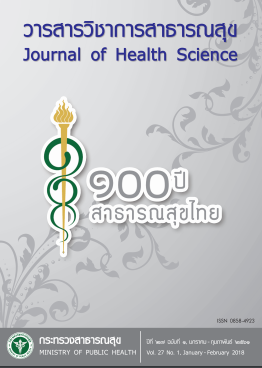ประสิทธิผลการใช้โปรแกรมการดูแลตามระยะเปลี่ยนผ่านผู้ป่วยสูงอายุโรคหลอดเลือดสมองในโรงพยาบาลประสาทเชียงใหม่ต่อความสามารถในการปฏิบัติกิจวัตรประจำวันและคุณภาพชีวิต
คำสำคัญ:
โปรแกรมการดูแลตามระยะเปลี่ยนผ่าน, โรคหลอดเลือดสมอง, ความสามารถในการปฏิบัติกิจวัตรประจำวัน, คุณภาพชีวิตบทคัดย่อ
การศึกษานี้เป็นการวิจัยกึ่งทดลองโดยมีวัตถุประสงค์เพื่อศึกษาประสิทธิผลการใช้โปรแกรมการดูแลตามระยะเปลี่ยนผ่าน ในผู้ป่วยสูงอายุโรคหลอดเลือดสมองที่เข้ารับการรักษาในโรงพยาบาลประสาทเชียงใหม่ ทำการศึกษาในกลุ่มตัวอย่างจำนวน 63 ราย แบ่งเป็นกลุ่มทดลอง 29 ราย และกลุ่มควบคุม 34 ราย วัดก่อนและหลังการทดลอง (two groups pre-post test design) ทำการศึกษาเป็นเวลา 1 ปีระหว่างเดือนตุลาคม 2557 ถึงเดือนกันยายน 2558การเก็บรวบรวมข้อมูลทำ 2 ครั้ง คือเมื่อผู้ป่วยเข้าพักรักษาตัวในโรงพยาบาลภายใน 24 ชั่วโมงก่อนให้โปรแกรม และภายหลังจำหน่ายจากโรงพยาบาล 12 สัปดาห์ โดยใช้แบบประเมินการปฏิบัติกิจวัตรประจำวัน ผู้ป่วยโรคหลอดเลือด-สมองของ Mahoney FI และ Bathel DW และแบบวัดคุณภาพชีวิตของผู้ป่วยโรคหลอดเลือดสมองของ Ferrans CE และ Powers MJ การศึกษาพบว่าหลังการทดลองกลุ่มทดลอง มีคะแนนความสามารถในการปฏิบัติกิจวัตรประจำวันเพิ่มมากขึ้นและแตกต่างจากกลุ่มควบคุมอย่างมีนัยสำคัญทางสถิติ (p<0.05) ไม่พบความแตกต่างของระดับ คุณภาพชีวิต ดังนั้น การศึกษาครั้งนี้แสดงให้เห็นว่าโปรแกรมดังกล่าวสามารถนำไปปรับใช้ในการดูแลผู้ป่วยสูงอายุโรคหลอดเลือดสมองในระยะเปลี่ยนผ่านได้
Downloads
ดาวน์โหลด
เผยแพร่แล้ว
วิธีการอ้างอิง
ฉบับ
บท
การอนุญาต
ลิขสิทธิ์ (c) 2018 Journal of Health Science- วารสารวิชาการสาธารณสุข

This work is licensed under a Creative Commons Attribution-NonCommercial-NoDerivatives 4.0 International License.







